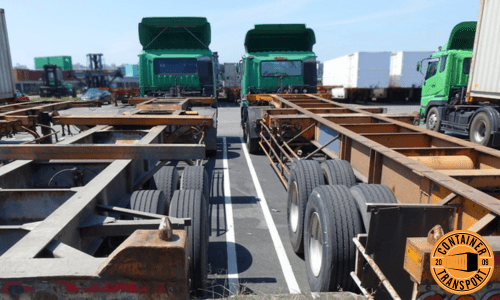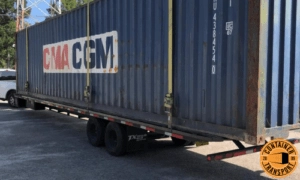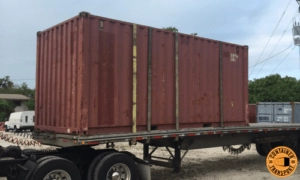Choosing the right trailer for container transport can save you money and make your shipping safer. Placing the wrong shipping container on a trailer not suited for it can lead to delays and compliance issues and even increase the risk of accidents.
Here’s what you need to know when selecting a trailer for container transport.
Understanding Container Types and Their Requirements
Standard container sizes are 20-foot, 40-foot and 45-foot. A container trailer and side lifter can be the right fit for containers up to 40 feet. Larger containers may need a flatbed or landoll trailer.
Weight matters, too. A loaded 40-foot container can weigh up to 67,200 pounds, so you’ll need a trailer with the proper axle configuration and weight rating.
If you are using an oversize, high cube or refrigerated container, you may need a specialty trailer. A refrigerated unit, for example, will need a power source.
Choosing the wrong chassis for container transport could result in delays, added costs or even DOT violations. That’s why it pays to get it right.

Common Trailer Types for Container Shipping
Let’s break down the most common trailer options for moving containers:
- Container chassis trailers: These trailers are purpose-built to move shipping containers on trailer beds securely and efficiently. Twist locks secure containers in place, and a frame design matches container dimensions. These trailers have 2-3 axles and typically have a load capacity of up to 80,000 lbs. Landing gear for these trailers can include sand shoes, landing legs and footplates.
- Flatbed trailers: A flatbed offers flexibility when a container chassis isn’t an option because this trailer can handle multiple container sizes and allows side loading with a forklift or crane. The weight capacity depends on axle count and trailer length.
- Tilt or tipping trailers: These trailers use hydraulic systems to angle the trailer bed for loading and unloading, making them ideal for locations without loading docks, lifts or cranes. These trailers are useful for delivering containers to residential or rural sites. They can also save time and labor on jobsites and in disaster relief areas.
- Specialized trailers: When the job demands more than standard equipment, specialized trailers deliver. Lowboy or RGN trailers carry oversized containers and heavy equipment. Gooseneck trailers provide improved balance and maneuverability, while extendable trailers accommodate non-standard container lengths.
Key Factors in Trailer Selection Decisions
So, how do you determine the best trailer for shipping a container? Consider:
- Container size and weight: Larger or heavier containers need stronger trailers. Any trailer must meet the length and width capacity, height capacity and weight of your loaded container.
- Available loading and unloading equipment: No crane? You’ll need a tilt or drop trailer.
- Route and distance: Long hauls over rough terrain may require specific suspension or clearance.
- Cost: Renting may make more sense than owning if your shipping needs are occasional.
- Legal compliance: Different states have different weight and length regulations for trailers. Most states also have requirements for maintaining trailers correctly and securing containers to the trailer.
If you are shipping often, you may want to consider paying close attention to your budget and the trailers you may need since costs can add up. Container Transport offers loading and unloading services so you don't need to worry about loading trailers yourself.
Ship Right, Every Time
Selecting the right trailer for container transport keeps your cargo safe, cuts costs and avoids unnecessary delays. From flatbeds to specialized chassis for container hauling, Container Transport has the solutions you need. To get started, call (800) 570-8239 or submit a free estimate form.
Related Articles
- Moving an Empty Container
 The logistics of moving an empty shipping container seem straightforward, but you require a team that has years of experience to get an item this large from point A to point B.
The logistics of moving an empty shipping container seem straightforward, but you require a team that has years of experience to get an item this large from point A to point B. - Transporting a 20-Foot Container
 Container shipping strategies for 20-foot units vary according to multiple factors. Contact Container Transport for expert-tailored logistics services.
Container shipping strategies for 20-foot units vary according to multiple factors. Contact Container Transport for expert-tailored logistics services.